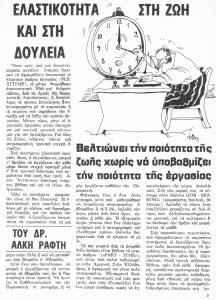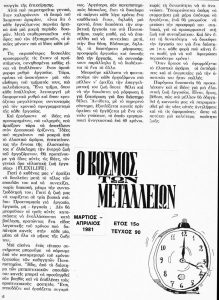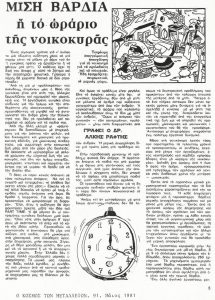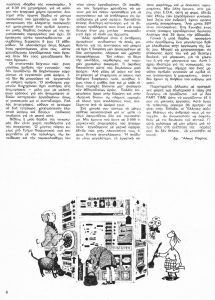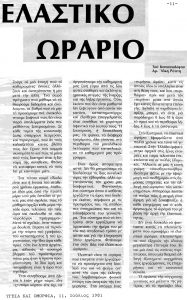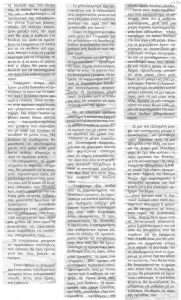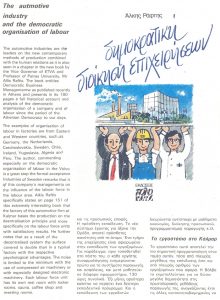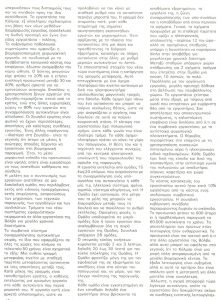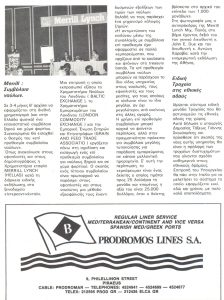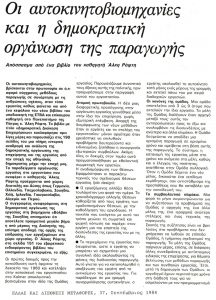Workers’ cooperatives in Greece.
Management problems and prospects
by
Dimitris Stavroulakis, University of Piraeus
and
Alkis Raftis, Associate Professor, University of Patras
1. Abstract
This paper attempts a description of the evolution of workers’ cooperatives in Greece,
and an assessment of their operation. Economic success is found to depend generally
upon the sector, handicrafts being the most successful because of their expanding
market. Although in many countries manufacturing cooperatives constitute the main
body of workers? cooperatives, in Greece they face serious problems of viability.
Major problems inhibiting the development of Greek worker cooperatives include
the decline of cooperative ideology in general, the absence of an adequate supporting
infrastructure, members’ inexperience and indifference, as well as party politics.
2. Introduction
The economic and social role of workers’ cooperatives (Wcoops) is recognized
worldwide. Wcoops constitute a most useful tool for the promotion of regional
development and the stoppage of migration towards urban centers; this is achieved by
offering job opportunities in neglected areas, by exploiting local resources that may
not be utilized otherwise and by integrating dispersed and fragmented financial means
in order to set the basis for the formulation of a rational economic policy.
Wcoops also contribute to the solution of the unemployment problem by joining
together workers and craftsmen hit by the economic crisis. Moreover, they have been
proved very helpful in securing jobs for relatively disadvantaged groups of workforce,
such as young people and women (Guigni, 1983).
Wcoops also contribute to the solution of the unemployment problem by joining
together workers and craftsmen hit by the economic crisis. Moreover, they have been
proved very helpful in securing jobs for relatively disadvantaged groups of workforce,
such as young people and women (Guigni, 1983).
Dominant motivations behind the formation of Wcoops have appeared quite
divergent. Utopian socialists like Owen and Fourrier, conservatives like Huber and
King, guild socialists like Cole and Penty, as well as Marx and Lenin have expressed
explicit views as regards to the social role and the dynamics of Wcoops. Cornforth
et al (1988: 8-9) distinguish three main ways by which Wcoops may be founded,
including activities of philanthropic proprietors who cede their companies to the
workers, radical self-management and workers’ control movements, as well as worker
attempts for job creation or saving, either by buying out failing firms, or by installing
new Wcoops for the members’ benefit. In the 1990s, however, a growing emphasis on
Wcoop viability and effectiveness is apparent.
3. Theoretical considerations
The term ‘workers’ cooperative’ has been extensively used in order to designate
various types of organizations. Generally speaking, a Wcoop is founded when a
number of workers or craftsmen abandon their professional autonomy and join
together under equal terms, in order to form a common enterprise. Seen from another
point of view, a Wcoop is a cooperative of particular type, the members of which
constitute at the same time its personnel.
Product manufacturing Wcoops, the members of which cooperate through their
work and tools in order to bring products to the market, are distinguished from work
supply Wcoops, the members of which offer only their working power, whereas
raw materials and sometimes equipment are provided by a contractor. Work supply
Wcoops are easy to manage because of their simple structure, whereas the product
manufacturing ones face the competition of conventional firms and, therefore, have
to purchase high-technology equipment and to adopt modern management and
marketing methods (Tzortzakis, 1971).
Without going into the details of relevant research, the main advantages of a Wcoop
compared to a capitalist firm include a preferential treatment by the state, low
expenses and high quality of products (since workers, being owners at the same time,
are motivated to maximize the outcome of their effort), good interpersonal relations
on the shop floor due to the solidarity spirit, and the concentration of resources
of many persons for the formation of capital funds. On the other hand there exist
serious drawbacks, such as the conventional firms’ predominance in the market,
difficulties in applying innovations owed to members’ resistance, and the limits set to
entrepreneurial activity by cooperative principles and law.
There exists confusion regarding the exact nature of cooperative principles, which
distinguish a Wcoop from a capitalist company. Some of the original principles
invented by Rochdale Pioneers have been informally abolished (such as buying and
selling in cash only, neutrality concerning politics and religion and fine quality of
products), others have been added, whereas others have somehow been modified
by the time in order to be adjusted to the socio-economic needs of the market (Les
principes coopératifs hier, aujourd’hui, demain, 1967). For example, a principle set
by Buchez stating that reserve fund is not to be distributed among members even
after the closing of the Wcoop, but it has to be used for welfare activities, is applied
occasionally; this principle, however, has been characterized as the touchstone
differentiating Wcoops from capitalist enterprises (Lambert, 1964).
The principles set nowadays by the International Cooperative Alliance (ICA) include
open membership (however, the existing members are entitled to decide about
the entrance of the applicants), democratic control (expressed in one member-one
vote), equitable distribution of surplus (in proportion to members’ effort or amount
of transactions, not according to the number of shares possessed), limited return
on capital, commitment to social and educational aims, and cooperation among
cooperatives. Obviously, the first four principles refer to operational issues and
the rest to the promotion of cooperativist ideals. Anyway, these principles do not
constitute binding regulations. In fact, law and Wcoops’ statutes sometimes permit
certain deviations in order to enhance entrepreneurial spirit. In this paper, therefore,
besides the study of Wcoops’ development in Greece, the impact of cooperative
ideology and principles on Wcoops performance is examined.
4. Notes on research methodology
Data presented was gathered within the context of a larger study conducted during the
1986-89 period. The sample finally included 8 Wcoops of various sectors, dispersed
all over Greece. The primary task of the research, however, was to provide a global
profile of Greek Wcoops (since this is, to our knowledge, the first field study ever
conducted in Greece on Wcoops), rather than to focus on particular issues concerning
solely those examined.
As a result, quantitative sociological methods such as questionnaires and scale-rating
have been proved inapplicable, because of the great number of issues to be examined.
The authors were also discouraged from using quantitative methods by a variety of
external factors, such as the reticence of interviewees, their apparent unwillingness to
fill a questionnaire, and the deformation of their answers revealed by their adherence
to party politics. The latter factor evolved in a major obstacle to the completion of
the research, since the authors themselves often faced overt or covert questioning
about their own political preferences. Unfortunately, declarations about the pure
academic character of scientific research are rarely credible within the turbulent
Greek industrial relations environment.
The array of qualitative methods used, included mainly semi-structured and
unstructured interviews with workers (members and non-members), foremen,
executives, members of Administrative and Supervisory Boards and Presidents of
Wcoops. Unobtrusive observation of behaviour during the execution of manual duties
proved to be very helpful for the interpretation of inconsistencies of gathered data.
We should mention that data concerning size, year of establishment and economic
performance of Greek Wcoops is rarely filed by the authorized public services. This
problem is partly attributed to the fact that Wcoops themselves seldom file data about
their own performance. Scant data was provided by the Rural Bank of Greece (ATE),
the Panhellenic Federation of Rural Cooperatives (PASEGES), the Panhellenic
Federation of Urban Cooperatives (PASYAS), the Hellenic Organization for Small
and Medium Enterprises and Handicrafts (EOMMEH) and the Departments of
Forestry and Fishery of the Ministry of Agriculture.
5. Historical background
The presence of Wcoops within the Greek cooperative movement has always been
very limited. Law 602/1915 laid the foundations for the establishment of cooperatives
in Greece, but had little effect outside the rural sector. The first legal devices
concerning Wcoops date to 1927, when the state turned to Wcoops for the supply of
army boots and clothing. The contract stated that Wcoop’s members should constitute
at least 2/3 of the total personnel, also forbade any subcontracts of the order, or part of
the order, to outsiders. Nevertheless, these terms were violated, resulting in the early
closing of the Wcoops.
By the turn of 20th century, the first “workers’ fraternities” or “guilds”, predecessors
of trade unions, had already appeared in Greece. Crate-makers in Patras, shoe-makers
in Athens, itinerant builders in Thessaly and port workers in Piraeus, Volos, Candia
and Patras were paid collectively through their respective organizations. Information
about them is scarce, but it seems that most of these organizations would undertake
autonomous work instead of imposing terms to employers. Law 216/1914 allowed
all workers organizations to adopt a trade union structure (Kordatos, 1972). Anyway,
trade unions did act as work supply Wcoops, when distributing work or paying
collectively their members.
A unique case in Greece concerning the simultaneous operation of a Wcoop and a
trade union, is encountered in the Candia prefecture among workers employed in
raisin industry. Each one of the 107 workers employed in the 15 factories of the
prefecture is member of both organizations, founded in 1945. The Administrative
Board of the Wcoop has 5 seats, and the Administrative Board of the trade union has
7 seats; members are allowed to participate in both Boards and the same person is
generally elected as President. Thus roles are rather confused in practice, whereas
in theory there exist two distinct bodies. The Wcoop deals with operational matters
(such as who will work, in which factory each one will work, how income will be
distributed to members) and the trade union formulates demands to the employers.
Law 1627/1939 allowed preferences to Wcoops for forestry activities such as pine-
resin collecting, wood-cutting and wood transporting. Also Law 1168/1944 initiated
the renting of lakes and lagoons to fishermen Wcoops. First Wcoops in these sectors,
however, were established without any preparation and most of them were soon
dissolved.
We witness three major periods concerning the intensity of interest for the formation
of Wcoops :
A first flourish of Wcoops took place during the restoration period (1950-55),
initiated mostly by former war comrades. A lot of these Wcoops were founded upon
the initiative of a single person, who managed to persuade the dispersed craftsmen
to join together. By this initiative he gained members’ confidence and eventually
was elected President of the Wcoop. The few surviving Wcoops of this generation
have apparently fallen into decadence. Founding members held craftsmanship as an
ideal, believed in material and moral upgrading through cooperation and strove for a
peaceful and honest business. Industrial development inflicted a serious blow to them
by imposing a devastating competition, as well as by altering the traditional patterns
of values.
A second wave has been observed during the 1978-80 period, when much was said
about the impending implications over self-employed craftsmen, in view of the
entrance of Greece in the European Community. Most of these Wcoops, however,
were soon dissolved owed to the lack of an appropriate infrastructure, as well as to the
bureaucratization of procedures for acquiring financial support.
Between 1982 and 1986 we witness a new blossom, owed to the technical and
financial assistance provided by the EOMMEH. During this period, a number of
mostly short-lived self-management experiments took place, when workers and
craftsmen adhered to the socialist party attempted to implement their ideology
in practice. Nevertheless, easy access to loans provided amply by the socialist
government, resulted in the installation of many non-viable Wcoops, since state
agencies were insufficiently organized for checking the proper use of granted loans.
Thus, recent budget cuts enacted by the conservative government resulted in the
closing of a substantial number of Wcoops and the falling of many others into inertia.
6. Legal framework
The development of cooperative movement in Greece is regulated by Laws 1541/
1985 and 1667/1986 for rural and urban cooperatives respectively. A minimum of 15
persons is required for the establishment of an urban cooperative, whereas 50 persons
are at least required for the formation of a rural one. Increased number of founding
members of rural cooperatives aims at the stoppage of further fragmentation of Greek
cooperative movement. Besides the Administrative Board, the Supervisory Board – an
influence of German legislation – is also elected by the General Assembly in order to
perform management auditing and to validate acts of Administrative Board.
Members of rural cooperatives are entitled to one share and one vote in the General
Assembly. Members of urban cooperatives are also entitled to one share and one vote
in the General Assembly, but the statute of the cooperative may allow the acquisition
of up to five optional shares without a vote right. Profits of rural cooperatives
are distributed according to their statute, whereas profits of the urban ones are
distributed in proportion to the shares, unless defined otherwise in their statute. Rural
cooperatives are not allowed to distribute the reserve fund after their closing: after
settling debts and paying back members’ shares, the residue is donated to the regional
cooperatives’ association. On the contrary, urban cooperatives distribute the residue in
proportion to members’ shares.
Administrative supervision of rural cooperatives is performed every two years by
the Institute of Supervisors of Cooperative Organizations, belonging to the Ministry
of Agriculture. On the other hand, the Agency for Urban Cooperatives, belonging
to the Ministry of National Economy, is authorized for the supervision of urban
cooperatives. It should be mentioned that both rural and urban supervisory bodies lack
an adequate infrastructure enabling them to perform their duties effectively.
A particularity of Greek legislation consists in the establishment of a strong state
intervention in cooperative matters. A justification is offered by the fact that
cooperative movement has always been weak in Greece, requiring constant support
and assistance, whereas in most European countries the state came only afterwards to
recognize and regulate cooperative development.
7. The present situation
The economic situation of Greek cooperatives is critical. Amassed debts of rural
cooperatives only (urban Wcoops are overdebted too, but no relevant data is
available) amount to about 100 billion drachmas (approx. 520 million U.S.$). The
problem of settlement of cooperatives’ debts appears to be a complex one, and no
final solution has been found yet.
Present situation of Wcoops is illustrated in Table 1, according to a census of 1988.
Rural cooperatives apparently are prevailing over the urban ones, since they constitute
88,44 percent of the total concerning their number and approximately 90,0 percent
concerning their members. Wcoops are largely concentrated in the woodlands of
Macedonia, Thrace and Epirus. Data about the activities of each sector is presented
briefly in the following.
7.1. Forestry
As shown in Table 1, forest Wcoops are most commonly encountered compared to
those of other sectors. Nevertheless they constitute only a small percentage (2,19 and
8,03 of the entire rural cooperative population concerning their members and number
respectively). There exist five forest cooperative associations in Thessaly (27 Wcoops
totaling 980 members), Sterea Hellas (75 Wcoops totaling 2.662 members), Central
Macedonia (35 Wcoops totaling 2.873 members) and Peloponese (8 resin-collecting
Wcoops totaling 376 members). The first three aforementioned associations have
established respective companies for the processing and sale of wood collected.
Gross receipts of Wcoops, associations and cooperative companies in 1988 amounted
to 4.482 million drachmas (approx. 22,40 million U.S.$), their economic performance
considered mediocre. Gross receipts of wood processed only, amounted to 367,535
million drachmas (8,20 percent of the total), a fact that indicates an acute lack of
processing installations.
Wood-cutters’ profession is seasonal (May to September); the rest of the year they
deal with agricultural activities. Although gross receipts of Wcoops are increasing
substantially every year, the situation is far from satisfying owed to the scarcity
of country roads for the facilitation of transports of wood cargos, as well as the
easy access of wood-cutters to remote areas, the shortage of storing places for the
protection of cut wood from the rain, the lack of a consistent plan for the balanced
exploitation of forests and finally, the lack of an adequate sales network, despite the
efforts of Wcoops’ associations.
7.2. Fishing
Fishing Wcoops include 79 hatcheries totaling 2.673 members, 34 coastal fishing
totaling 1.782 members, 8 of fishermen employed in power-engine vessels totaling
202 members, 6 of skippers occupied in open sea fishing totaling 167 members and
one of sponge-fishermen with 68 members. A fishing Wcoops association has been
established in 1951, including 34 Wcoops with 963 members.
Gross receipts of fishing Wcoops and the association in 1988 amounted to 3.834
million drachmas (approx. 19,17 million U.S.$), their economic performance
considered poor. Fishing activities are falling steadily the last 20 years, especially
regarding coastal and open sea fishing, whereas losses of hatcheries caused by
pollution are partly counterbalanced by a moderate development of pisciculture.
Pollution caused by chemical fertilizers and waste has already destroyed many
fisheries, but still no effective measures have been taken.
Another problem inherent in common property resource systems concerns
exploitation without limits, termed as the “tragedy of commons” by Hardin (cited by
Prattis, 1987: 573). Despite the dramatic decrease of fishery in already overexploited
areas, no upper limit has ever been set concerning the allowed quantity of fish caught,
and consequently livelihood and viability of the fishery are in danger. Fishermen
neither limit their exploitative efforts for the sake of conservation of fishes, nor make
any investments on projects for the improvement of their fisheries. This attitude is
probably connected with the fact that hatcheries have a two-year renewable contract,
considered short-termed. In this sense, consistent educational programs for fishermen
would prove very helpful for the formulation of a rational resource management
policy.
The concentration of 34 hatcheries Wcoops in the prefecture of Aitolias-Akarnanias
is mainly due to party politics (there exist “socialist” and “right-wing” Wcoops).
Political polarization has dismantling effects, since preferential treatment of certain
Wcoops concerning the priority and the terms of the contract for renting of lakes and
lagoons by the authorized public clerks, causes social unrest to the local communities.
7.3. Handicrafts
There exist 37 rural and 49 urban handicrafts. Classification is made solely according
to members’ preference, since all handicrafts are producing folk art articles, mostly
embroidery. In this context, 61,62 percent of handicrafts are consisted exclusively of
women (for more details on women’s’ cooperatives see Papagaroufali, 1986; Bruyn,
Nicolaou-Smokoviti, 1989: 245). Owed to the interest shown in folk art products by
the tourists, 47,67 percent of handicrafts are located in the islands. Most handicrafts
are very profitable; gross receipts in 1988 amounted to about 2.000 million drachmas
(approx. 20 million U.S.$), although their total equity capital did not exceed 50
million drachmas (approx. 250 thousand U.S.$).
7.4. Mining
The 25 mining cooperatives are designated, according to their statutes, as rural
cooperatives. It is worth mentioning that 3/5 of them are located in the prefectures
of Drama and Kavalla. A big average number of members is noticeable, owed to the
many workers required to
run a mine.
Gross receipts in 1988 amounted to 180.563 thousand drachmas (approx. 990
thousand U.S.$), their performance considered satisfactory. About 5-7 mining
Wcoops use modern technology and management methods, and have export activities.
In few distinct cases also, efforts are made to
moderate the inequality between quarry work, which is tiresome and low-paid in
the private sector, and sawmill work, which is considered skilled and well-paid, by
offering higher wages to quarry men (Varelides, 1988: 24-29), also by establishing
occasional schemes of job rotation.
Manufacturing and other urban Wcoops. About 25 percent of the urban Wcoops are
plywood, 13,46 percent clothing and 11,53 percent confectionery. Urban Wcoops’
presence within the cooperative movement is marginal. Unfortunately, data about
their economic performance is not available; our research has shown, however, that
most of the plywood and the clothing ones face serious problems of viability, also that
organizational mortality of Wcoops in these sectors is high.
8. Management problems
Forest Wcoops use simple technology, are usually of small size and members’ tasks
are manual. Handicrafts also, despite their relatively bigger size, generally do not face
serious problems concerning finance and work organization, owed to the peculiarities
of market structure. On the contrary, fishing, mining and manufacturing Wcoops in
particular face acute managerial and financial problems.
Lack of capital is found to be the most common problem, as capital is provided solely
by members’ personal savings. Loans by externals are very rare and risky, because
cooperatives are not allowed to mortgage their property. Usually the lender asks for a
guarantee binding the Wcoop to purchase raw materials exclusively from him; such
a clause, however, establishes a dangerous dependence. In countries where a highly
developed cooperative sector exists, the central Wcoops body grants credit facilities,
or even possesses its own banks. In Greece, however, no similar institutions exist and
the state has shown reluctance in lending cooperatives. It is worth to mention that in
the past years state officials had refused to provide loans to Wcoops under the pretext
that cooperatives are non-profit organizations. Only during the 1982-85 period did the
situation change, owed to the low-interest loans granted by EOMMEH.
Workers’ involvement in decisions constitutes a crucial difference between Wcoops
and capitalist firms. In Greek Wcoops through, most members are reluctant to
assume responsibilities. They rarely take part in transactions and prefer to elect in
administrative positions the same persons on a permanent basis, only to criticize them
afterwards.
Usually they ignore the very essentials regarding the operation of their own unit, such
as production process, terms of procurement of raw materials and sales policy. This
attitude is enhanced by the fact that cooperatives’ entrepreneurial responsibility is by
law collective, without being transferred to each member separately and, therefore,
individual members have no serious economic loss in case of their cooperative’s
failure.
Anyway, the fact that the administrative body is elected seems to cause occasionally
discipline problems, thus undermining its own authority. Decisions are reluctantly
carried out, work pace is slow, disputes break out and members quit for personal
reasons. The case of a plywood Wcoop located in Crete illustrates the problem.
Several members had no fixed working hours and were delaying work assigned to
them, thus retarding production and causing complaints of customers. The General
Assembly rejected proposals for the establishment of some sort of supervision and
control, whereas remarks addressed to careless workers by their colleagues caused
acute conflicts.
Besides, an absence of entrepreneurial spirit is obvious in most Greek Wcoops. The
latter avoid taking any radical decisions such as the renewal of equipment and the
adoption of modern production, management and marketing methods. Members are
apparently reluctant to introduce innovations, partly out of fear of changing their
manual duties, also because they object to the temporal limitation of their income in
order to improve their business (see also Bellas, 1975: 209-210). This phenomenon
is best illustrated in a fishing Wcoop located in Western Greece, occupying three
full-time clerks-members in order to perform calculations for the assistance of the
accountants. The General Assembly rejected a proposal for the introduction of
machinery accounting, despite its relatively low cost.
Despite the official goals stated in General Assemblies and Board meetings, in
fact most Wcoops are invariably run on a day to day basis. Only 29 percent of the
agricultural cooperatives are estimated to bring up to date their accounting books,
whereas 12 percent do not keep accounting books at all (Latifis, 1989). At this point
it should be noted that Wcoops are disadvantaged compared to conventional firms
owed to the fact that most customers demand the transactions to be done informally
(without invoice or receipt) in order to avoid paying taxes. Others demand special
treatment, usually bargaining for lower prices, despite the binding decisions of the
General Assembly of the Wcoop.
A lack of financial incentives is also apparent. As implied previously, in Greece
distribution of surplus according to individual effort or to individual participation
has proved unpopular, since members definitely deny to be submitted to evaluation.
Thus in practice urban Wcoops distribute profits according to the number of shares,
whereas the rural ones distribute profits equally to members. In this manner, however,
the most efficient members are demotivated. Also bureaucratic procedures concerning
the remuneration of members of both the Administrative and Supervisory Boards
confine substantially their activities.
Successful Wcoops are supposed to limit the entry of new members, preferring the
employment of salaried workers and thus gradually being assimilated to conventional
firms (cf. Lambert, 1964; Brewer, 1988). In many countries legislation imposes the
acceptance of new members after the lapse of a probation period (Lambert, 1964).
In manufacturing Wcoops salaried workers have not shown any interest to become
members, either because they cannot afford to pay the required price of the share
or because they do not consider membership profitable, preferring the status of the
salaried worker.
On the contrary, a great number of persons are applying for membership in
handicrafts and fishing Wcoops. Since many handicrafts are expanding, the
acceptance of new members usually constitutes no problem. Concerning fishing
Wcoops, however, mass acceptance of new members would lead to intensification
of exploitation and to a rapid decrease of fishery, beyond the level ensuring that the
reproducing biomass can replenish itself.
Anyway, according to a clause included in the Law 1541/1985 for rural cooperatives,
persons applying for membership in fishing Wcoops retain the right to appeal the
rejection of their application to the magistrate’s court. Finally, most of them are
justified and acquire membership despite the opposition of the General Assembly.
Fishing Wcoops Association claims for the abolishment of the aforementioned clause,
as well as for the imposition of limitations concerning members’ entrance, such as the
acceptance of only one member per family.
Wcoops also fail to induce competent staff, thus falling into decadence after the
retirement of the most active members. It is estimated that only 18 percent of
rural cooperatives employ salaried clerical staff (totaling 11.393 persons), and
graduates amount to 1.574 persons (13,8 percent of the salaried clerical staff). Lack
of competent executives apparently hinders Wcoops’ expansion and development
(Latifis, 1989).
A much discussed principle requires political and religious neutrality in order to
achieve unity of the cooperative movement. On the other hand, practice has shown
that Wcoops formed by members sharing common beliefs have achieved considerable
cohesion, resilience to crisis and motivation for further development (cf. Barkai,
1972; Raftis, 1984: 113-117; Nicolaou-Smokoviti, 1988: 111-117; and Whyte,
Whyte, 1988). In Greece, cooperative neutrality had been used as a pretext for the
persecution of leftist members during the 1948-74 period. Political polarization has
caused segmentation of cooperative movement, thus inhibiting the formulation of a
unitary cooperative policy. Many Wcoops are engaged in endless political conflicts
instead of dealing with their own functional problems.
9. Conclusions and prospects
Our research showed that Wcoops in Greece constitute a recurring phenomenon
and they appear to be very sensitive to the alterations of socio-economic climate.
Economic crisis and fear of competition promotes solidarity spirit and motivates
producers and workers to work together. Nevertheless, inflation and price increases
favour intermediaries and speculators to impose their own terms on the market, thus
inhibiting Wcoops’ development. Recent budget cuts enacted by the government
resulted in the neglect of all efforts (albeit uncoordinated and isolated) aiming at the
creation of an infrastructure allowing Wcoops to become self-sufficient. At present,
however, Greek Wcoops cannot develop without state support regarding access to
capital, training of members, development of cooperative managers, and consulting
assistance.
The debate on cooperativism versus viability/success has not produced many definite
answers. In Greece there exist no examples of Wcoops ‘“corrupted” by the intrusion
of capital but on the contrary, Wcoops are pursuing to induce capital investments by
externals. Anyway, despite the facilities provided by several urban Wcoops’ statutes,
a total absence of investors is observed.
Major structural inadequacies of Greek Wcoops such as lack of discipline,
bureaucratic decision-making and absence of evaluation systems, seem to lie in
the low level of members’ commitment than in the principle of democratic control
itself. As shown in another study of a Greek self-managed enterprise of craft
technology (Stavroulakis, 1989: 111-112), members used their power in order to
avoid responsibilities and the establishment of regulations, instead of introducing full-
fledged participation in business matters. In contrast, the case of a marble mining
Wcoop examined in this research is referred, where members’ dedication to self-
management ideals resulted in their willingness to be submitted to evaluation and
to accept discipline regulations. Nevertheless, economic success is found to depend
rather on the sector than on members’ consciousness; the latter has proved to fade
away under economic hardship. Anyway, economic success has not proved to
increase members’ commitment.
As already implied, the principles of cooperation among cooperatives and promotion
of educational and social aims are largely neglected by Greek Wcoops. Nevertheless,
a clear undertaking of responsibility and accountability by Wcoops’ members is
indispensable for the promotion of entrepreneurial spirit and the upgrading of Wcoops
in general. In this aspect, integrated educational programs should be put forward both
for Wcoops’ members and public clerks dealing with cooperative issues.
Finally, we should remark that a good reason for the critical situation of the
cooperative movement is provided by the decline of ideologies and the degradation of
social values, especially of cooperation (Gherardi, Masiero, 1987) within the Greek
socio-cultural context. Even the abstract notion of cooperation is degraded, adding
etymological overtones to the problem: in Greek, a workers’ cooperative is called
“synergatiki”, a word stemming from “synergasia”, meaning simply collaboration.
Bibliography
BARKAI, Haim: ‘The Kibbutz: An Experiment in Microsocialism’, in Israel and
Arabs: Views From the Left. New York, Bantam, 1972: 69-100.
BELLAS, Carl: ‘Industrial Democracy Through Worker Ownership: An American
Experience’, in Vanek, Jaroslav (ed.): Self-Management: Economic Liberation of
Man. Harmondsworth, Penguin, 1975: 203-212.
BREWER, Anthony: ‘Technical Change in Illyria’, in Journal of Comparative
Economics 12 (3) 1988: 401-415.
BRUYN, Severyn & Litsa NICOLAOU-SMOKOVITI: International Issues in Social
Economy. Studies in the United States and Greece. New York, Praeger, 1989.
CORNFORTH, C.; THOMAS, A.; LEWIS, J. and SPEAR, R.: Developing
Successful Worker Cooperatives. London & Beverly Hills, Sage, 1988.
GHERARDI, Silvia & Attilio MASIERO: ‘The Impact of Orgnanizational Culture in
Life-Cycle and Decision-Making Processes in Newborn Cooperatives’, in Economic
and Industrial Democracy 8 (3) 1987: 323-347.
GIUGNI, Gino : ‘Self-Management and the Problem of Employment’. Paper
presented at the Second World Conference on Industrial Cooperatives: ‘For a
Democratic Industrial Revolution: Worker Cooperatives on the Horizon of the Third
Millenary’. Warsaw, 5th-8th October, 1983.
KORDATOS, Yiannis : History of Greek Labour Movement. Athens, Boukoumanis,
1972 (in Greek).
LAMBERT, Paul: La Doctrine Cooperative. Bruxelles, Les Propagateurs de la
Coopération, 1964.
LATIFIS, Kostas: “Standstill of Rural Cooperatives Requires Prompts Decisions
Despite Political Costs”, in Economic Review (weekly), 10 August 1989: 86-90 (in
Greek).
Les principes coopératifs hier, aujourd’hui, demain. Paris, Institute des Etudes
Coopératives, 1967.
NICOLAOU-SMOKOVITI, Litsa : New Institutions in Industrial Relations:
Participation and Self-Management. Athens, Papazissis, 1988 (in Greek).
PAPAGAROUFALI, Helen: “Self-Management and Womens’ Cooperatives in
Greece”. Paper presented at the International Conference: ?Self-Management :
Experiences and Perspectives?, organized by the Center of Planning and Economic
Research (KEPE). Athens, 28th-30th May, 1986.
PRATTIS, Iain: “Organizational Change and Adaptation: Community Cooperatives
and Capital Control in the Western Isles of Scotland”, in American Anthropologist 89
(3) 1987 : 567-580.
RAFTIS, Alkis: Democratic Management of the Enterprises. Athens, Polutypo, 1984.
STAVROULAKIS, Dimitris: Workers? Participation in Decision-Making. A Study
of Organizational Structure of Greek Industry. Unpublished Ph.D Dissertation,
University of Patras, 1989 (in Greek).
TZORTZAKIS, Theodoros: Cooperative Economy: History-Theory- Applications of
Cooperativism. Athens, 1971 (in Greek).
VARELIDES, Nicholas: “Workers’ Participation in Small and Medium Enterprises:
The Case of Greece”. Research Paper, Task Force on Small and Medium Enterprises,
European Community Commission, 1988 (unpublished).
WHYTE, Willian Foot & Kathleen King WHYTE : Making Mondragon: The Growth
and Dynamic of the Worker Cooperative Complex. Ithaca, ILR Publications, 1988.

